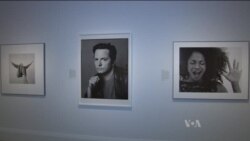The National Portrait Gallery holds more than 21,000 posters, paintings, and photographs in its collection. A new exhibition, “Eye Pop: Celebrity Gaze,” displays 53 of them. The theme is "Celebrity," but associate curator Dorothy Moss said the celebrities are perhaps not the ones that first come to mind.
“We’re not just thinking about celebrity in terms of a People Magazine," she said. "We’re really looking at 'celebrity' across fields. There will be subjects in the exhibition who will be immediately recognizable to visitors, and others who might not be."
Walking past the portraits sparks questions, not only about who a celebrity is, but also about how celebrities are made.
“In this media age, where we are all using social media, the status of celebrity is changing rapidly," Moss said. "Almost anyone can become a celebrity right now. And we hope our visitors will think critically about that when walking through the exhibition.”
The newest portrait in the exhibition, and one that most people would recognize, is of American actor Brad Pitt, by Irish artist Collin Davidson. The two spent many hours together, since Pitt was interested in learning how to paint from Davidson.
In the next room are portraits of people who have less recognizable faces, but very well-known achievements — celebrities like the founders of Google, and architect Maya Lin, who designed the Vietnam Memorial.
Video portrait
The portrait of young jazz musician Esperanza Spalding is done not on canvas, but on video. She is lying down and listening to her favorite song.
“That’s a very important part of the portrait because the artist, Bo Gehring, asks his subjects to choose a piece of music that has deep personal meaning, trying to capture the emotional response to music in time,” Moss said.
Other artists take a more critical view of celebrity. Mickalene Thomas’ signature technique is to encrust her prints with rhinestones.
Moss noted a portrait of media personality and philanthropist Oprah Winfrey, "completely encrusted and almost shining. She’s larger than life. Mickalene Thomas wanted to capture her glamour. It’s one of our portraits that is about 'celebrity' as a critique of celebrity. This is not a commissioned portrait.”
On the opposite wall is a print by Deb Cassis that seems utterly familiar. It references Andy Warhol’s famous portraits of celebrities such as Marilyn Monroe and Elizabeth Taylor.
Cassis “has put herself into the portrait to critique pop art, to insert a feminist voice into Warhol’s work," Moss said.
The National Portrait Gallery is known for displaying the portraits of famous Americans. Its "Celebrity" exhibition broadens that definition.





